How to Prevent Your Casings from Bursting During Stuffing or Cooking ?
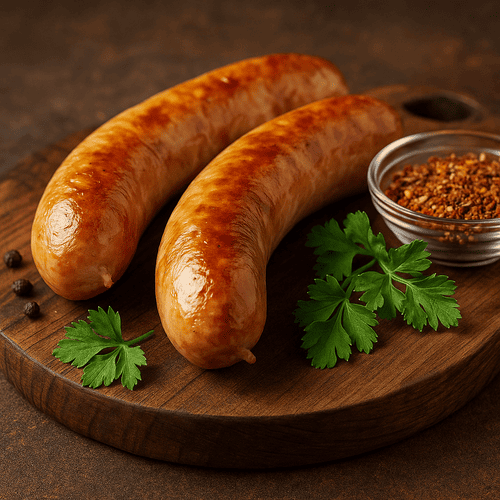
When making homemade sausages, nothing is more frustrating than seeing the casings burst during stuffing or cooking. Not only does this ruin the presentation, but it also alters the texture and the final quantity of the product. Fortunately, this problem can be easily avoided with a few best practices—especially if you use premium quality natural casings, like those offered by Cebonat.
1. Properly Desalt and Rinse Natural Casings
The first common mistake is insufficient desalting. Natural casings must be rinsed several times with clear water then soaked in lukewarm water to restore their flexibility and elasticity. Poorly hydrated casings behave like dry plastic: they break.
2. Soak for Long Enough Before Use
To guarantee optimal strength, let your casings soak in lukewarm water for at least 15 minutes for rehydrated, untangled casings in brine, and a minimum of 4 to 6 hours for dry-salted casings. Lukewarm water (but never hot) helps achieve a flexible and perfectly stretchable texture.
3. Do Not Overfill the Casings
One of the main causes of bursting is overfilling. You must leave a margin of flexibility so that the pressure can distribute itself. An overly taut casing will burst either upon exiting the stuffing nozzle, or later in the pot or frying pan. A professional-quality stainless steel meat stuffer allows for a more regular filling, limiting pressure variations.
4. Use Well-Mixed and Non-Compact Meat Filling
If the filling is too compact, it blocks air circulation and creates areas of tension. Properly mixing the meat, spices, and seasonings ensures a homogeneous and flexible texture. For a clean and homogeneous cut, a pro-quality stainless steel boning knife is also recommended, as poorly prepared meat increases the risk of bursting.
5. Prick Air Bubbles During Stuffing
Air bubbles are the enemies of homemade sausage. They create pockets that heat up faster than the rest and cause the casing to burst. A fine needle or a sausage pricker allows for easy removal.
6. Cook Gently to Avoid Thermal Shock
Cooking should always start over low heat or in water at 70–80 °C (158–176 °F). Thermal shock = exploding casings. Then gradually increase the temperature. Slow cooking also helps preserve all the flavors of the natural casings used.
7. Choose Genuine Quality Natural Casings
Finally, the most frequent mistake simply comes from poor quality or aged casings. Cebonat natural casings are carefully selected, calibrated, and prepared in a traditional way, guaranteeing flexibility, resistance, and consistency—three essential guarantees to prevent bursting. To accompany your preparation, our professional spices allow you to obtain an authentic, balanced, and flavorful result.
Preventing your casings from bursting is not a matter of luck, but of technique and quality raw materials. By adopting these simple steps and choosing quality natural casings, you will obtain perfectly formed, flavorful, and cooking-resistant sausages. The success of your preparations always starts with product quality—and on this point, Cebonat is a benchmark.
Why your natural casings are not all identical ?
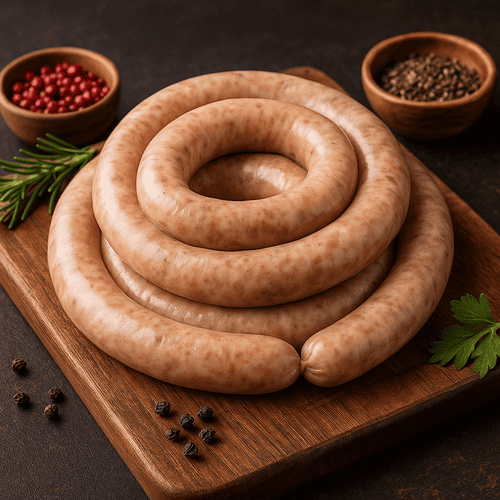
When a craftsman or a passionate amateur prepares their homemade sausages, they quickly notice that natural casings are never perfectly identical. This reality sometimes puzzles customers, but it is actually a guarantee of quality and authenticity.
Each Animal is Unique
Natural casings come directly from animals. As with any living material, there are natural variations in calibre (diameter), colour, and elasticity. These differences do not indicate a manufacturing defect but simply the uniqueness of each animal.
An Alternative to Standardization
Unlike artificial casings, which are uniform but lack character, natural casings are distinguished by their authenticity. At Cebonat, we emphasize this natural richness and reject any discount or artificial approach, while ensuring that the casing's calibre and quality are respected.
An Advantage for Your Preparations
These slight differences allow your sausages and cured meats to maintain an artisan appearance and stand out from industrial products. This is precisely what consumers seeking taste and transparency are looking for.
Products Adapted to Your Needs
To meet the expectations of both professionals and individuals, our shop offers a selection of hog, sheep, and beef casings, carefully prepared. For example, the fine calibre sheep casing is ideal for straight and regular sausages like chipolatas or merguez, while the medium calibre hog casing provides flexibility and resistance for more generous recipes (boudin [blood sausage], saucisse de toulouse).
Authenticity Above All
By choosing natural casings, you accept and value these minimal differences. They are a reflection of life and nature, and guarantee a healthy, authentic product that respects traditions.
Cebonat supports you in your cured meat preparations with natural casings and professional-grade spices, so you can successfully create your homemade recipes with complete peace of mind.
The 7 Essential Spices for Perfect Homemade Charcuterie
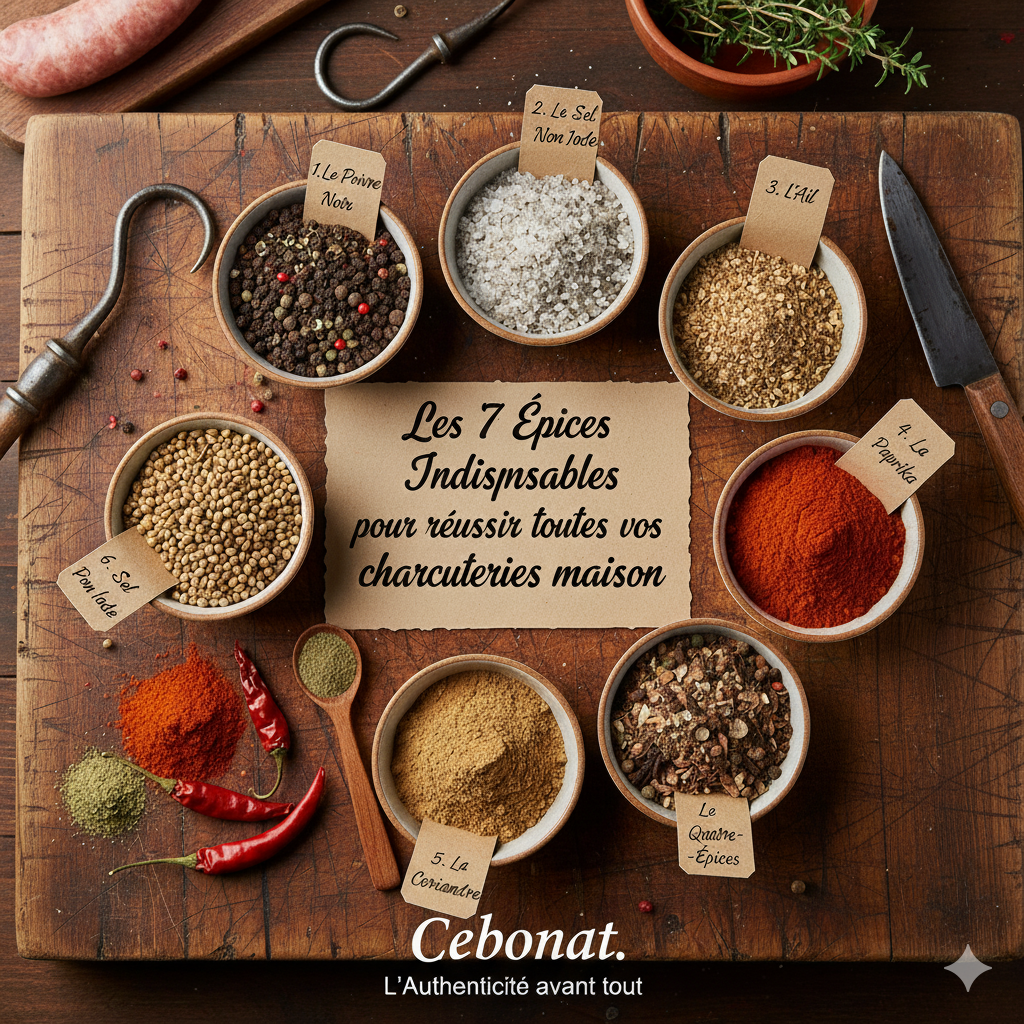
Here are the 7 essential spices that should be in the arsenal of every amateur or professional homemade charcuterie enthusiast.
1. Black Pepper: The Unmissable King
Black pepper is undoubtedly the most universal spice in charcuterie. Whether ground, cracked, or in whole peppercorns, it provides that pungent, aromatic note that awakens any preparation. Its power varies depending on the grind: finely ground, it quickly diffuses its aromas throughout the stuffing; coarsely cracked, it offers bursts of flavor in every bite.
Black pepper integrates perfectly into saucisses de Toulouse (Toulouse sausages), pâtés de campagne (country pâtés), terrines, and even saucissons secs (dry-cured sausages). For optimal quality, favor freshly ground pepper that retains its full aromatic power.
2. Non-Iodized Salt: More Than Just Seasoning
In charcuterie, salt plays a crucial dual role: it seasons while also contributing to the preservation and texture of your preparations. However, not all salts are equal. Iodized salt, commonly used in cooking, can alter the delicate taste of certain charcuterie products and interfere with the maturation process of dry-cured sausages.
Therefore, non-iodized salt is the absolute standard for all your charcuterie creations. It preserves the authenticity of the flavors without introducing an undesirable bitterness. Whether you are salting a stuffing, preparing a brine, or preserving your natural casings, non-iodized salt remains your best ally.
3. Garlic: Fresh, Powder, or Granulated?
Garlic is an emblematic spice in French and Mediterranean charcuterie. Saucisson à l'ail (garlic sausage), merguez, chorizo, pâtés... few preparations do not benefit from its pronounced and comforting character.
The question often arises: fresh garlic or garlic powder? In charcuterie, extra-fine granulated garlic offers the best compromise. Finer than dehydrated pieces of garlic, it disperses evenly throughout the stuffing and is less likely to burn during cooking. Fresh garlic, while flavorful, can develop bitterness during drying or prolonged cooking. Reserve it instead for fresh preparations consumed quickly.
4. Paprika: Color and Sweetness
Paprika is a versatile spice that brings both color and flavor to your charcuterie. Sweet or slightly hot, it enhances sausages, blood sausages (boudins), and especially chorizo, in which it is the star ingredient.
Paprika has the unique ability to naturally color your preparations without aggressively altering their taste. It provides a roundness on the palate and a slightly sweet note that balances the other, more potent spices. For an authentic chorizo, smoked paprika is even essential.
5. Coriander: Subtle and Unexpected Freshness
Often associated with Asian or Mediterranean cuisine, coriander seeds nonetheless have a place of choice in traditional charcuterie. Cracked or ground, they release citrusy and slightly sweet aromas that add complexity without overpowering.
Coriander pairs particularly well with pork and lamb, making it a key ingredient for merguez, Oriental-style sausages, and certain game pâtés. Its unique aromatic profile helps avoid monotony in your creations and pleasantly surprises seasoned palates.
6. Allspice (Quatre-Épices): The Secret to Successful Pâtés
Allspice, also known as quatre-épices (four-spices) in French, is the mystery ingredient in many traditional pâtés and terrines. True to its name, it single-handedly evokes the flavors of cinnamon, clove, nutmeg, and ginger.
This warm and comforting spice is particularly appreciated in pâtés de campagne, game terrines, and poultry preparations. Used sparingly, allspice provides an incomparable aromatic depth and that "homemade" touch that makes all the difference.
7. Chili Powder/Flakes (Piment): Accurately Dosing the Heat
Chili (whether mild or extra-hot) allows you to customize the intensity of your charcuterie according to your taste and that of your guests. A key ingredient in merguez, chorizo, and many Southern-style sausages, it provides that touch of character that awakens the taste buds.
The art of using chili in charcuterie lies in the dosage. Too much will mask the other flavors; properly mastered, it enhances the entire preparation by creating a progressive and pleasant heat. Always start with small quantities that you can adjust in your next batches.
Getting Started Right with Cebonat Blends
If you're a beginner in homemade charcuterie, these seven spices form your essential starter kit. However, we understand that measuring and balancing these ingredients can seem complex at first.
This is why Cebonat has developed a complete range of professional spice blends, specially formulated for each type of charcuterie: dry-cured sausage, chorizo, merguez, country pâté, game terrine, etc. Our blends incorporate these essential spices in perfectly balanced proportions, guaranteeing you a successful result every time.
Once you're comfortable with our blends, you can gradually customize them by adding a touch of cracked pepper, a hint of extra garlic, or a pinch of chili according to your creative desires.
Authenticity Above All Else
At Cebonat, we prioritize natural spices, free of artificial additives or unnecessary preservatives. Each spice is selected for its freshness and aromatic power, ensuring your homemade charcuterie has an authentic taste and distinct flavors.
Combined with our premium natural casings, these seven essential spices will allow you to create sausages, pâtés, and cured sausages that rival the best artisan charcutiers. Ready to get started? Begin with this solid foundation, and let your creativity express itself through your experiments!
Natural Casings and Religious Dietary Laws: What You Need to Know (Halal, Kosher)
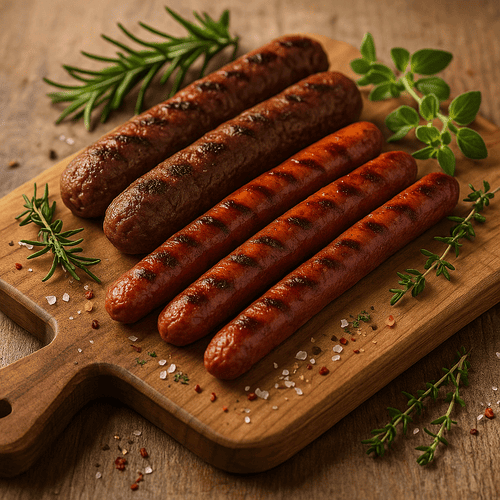
When it comes to making artisanal charcuterie or homemade sausages, the choice of casings isn't just a matter of texture and taste. For certain religious traditions, specifically Halal and Kosher, the origin of the casing plays a crucial role.
The Different Types of Natural Casings
* Hog Casings : Widely used in traditional European charcuterie, these are incompatible with Halal and Kosher preparations.
* Sheep Casings : Fine and delicate, they are perfect for sausages like merguez. They are suitable for both Halal and Kosher preparations, provided the animal was slaughtered according to religious rites.
* Beef Casings : Thicker and more robust, these are used for larger-caliber sausages and certain regional specialties. They are also suitable for Halal and Kosher diets under the same traceability conditions.
Halal and Kosher: What Are the Requirements for Casings ?
In both traditions, the observance of the ritual slaughter is essential. Therefore, a sheep or beef casing can only be used for a Halal or Kosher preparation if the meat adheres to religious prescriptions. The casing itself must have perfect traceability to the animal source.
Traceability and Transparency : A Guarantee of Trust
At Cebonat, the focus is on quality and transparency. The natural casings offered are rigorously selected and processed to guarantee their origin and conformity. This approach allows both professional artisans and home cooking enthusiasts to work with complete peace of mind.
Example Product Choices
For making homemade merguez, Cebonat's natural sheep casings offer finesse and elasticity, while being compatible with Halal practices if the origin of the meat is respected. For more substantial preparations like beef or poultry sausages, natural beef casings are particularly suitable.
In Summary
The choice of casing depends as much on the desired texture as on religious requirements. While hog is excluded from Halal and Kosher diets, sheep and beef casings fit perfectly within these culinary traditions. Thanks to the traceability and rigorous selection offered by Cebonat, everyone can cook with natural casings that are adapted to their specific needs.
What’s the secret to getting that ideal casing texture with a satisfying snap?
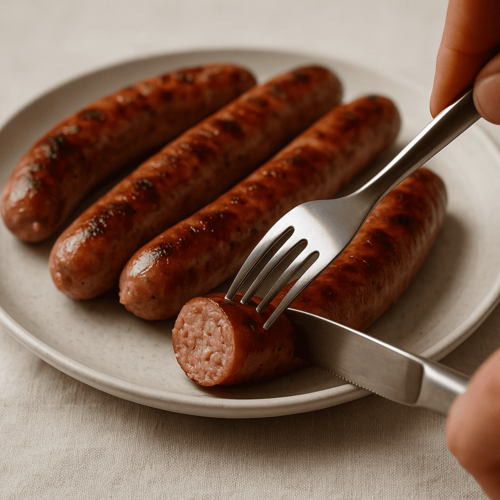
The success of a great sausage isn't just about the recipe for the filling. The quality and preparation of the casing play a crucial role in the eating experience. That famous "snap" when you bite, that slight crunch followed by a supple, juicy texture, is the sign of a well-prepared natural casing.
- Properly Preparing Natural Casings
Before stuffing, soaking and rinsing the casings are essential. After desalting, soak them in lukewarm water for several hours (for dry salted casings) or 15 to 20 minutes (for casings in tins or on pipes) to help them regain their full flexibility.
A well-hydrated casing will be easier to handle and will have optimal elasticity. For amateurs and professionals alike, using fine-caliber natural sheep casings provides a particularly sought-after snap for chipolatas and thin merguez (be mindful of the diameter of your nozzle).
2. Stuffing: The Balance Between Tension and Flexibility
Successful stuffing hinges on a happy medium: not too tight, not too loose. If it's too tight, the casing risks bursting during cooking; if it's too loose, the sausage loses its crunch and aesthetic appeal.
To make things easier, using our stainless steel nozzles for stuffers ensures a consistent fill, respecting the natural structure of the casing.
3. The Right Cooking Method to Preserve Elasticity
Cooking is the final step that determines the texture. A temperature that's too high will dry out and harden the casing. The ideal is to cook your sausages over medium heat, turning them regularly, to preserve their elasticity and flavor. A properly prepared and well-cooked natural casing maintains its role as a protective shell, allowing the filling to stay juicy and flavorful while providing that famous crunch.
4. Choosing the Casing: A Mark of Professionalism
The desired texture also depends on the type of casing chosen. For more details on the ideal casing choice, see our guide: "Why are some casings 'crunchier' than others?"
The Art of the Perfect "Snap"
Achieving the ideal casing texture requires precision and passion: careful preparation, balanced stuffing, and controlled cooking. By following these steps, you guarantee your guests a unique sensory experience where quality and a natural feel are paramount.
Cebonat, a specialist in natural casings and spices for charcuterie, provides professionals and enthusiasts with the essential products needed to succeed with every preparation.
Why are some sausage casings more crispy than others ?
The "snap" depends on the type of casing, the preparation, and the cooking method.
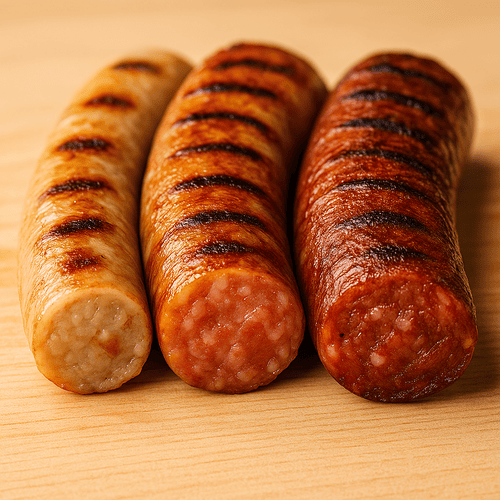
The famous "snap" you get in every bite—that satisfying little crunch—is no accident. With 100% natural casings, several factors come into play: the species (sheep, hog, beef), the diameter, the wall thickness, preparation before stuffing, and the cooking method. This educational guide explains why your sausages don't all have the same resistance to the bite and how to adjust your process to achieve the ideal texture.
1) Sheep, Pork, Beef: Naturally Different Textures
* Sheep Casing
- Profile: Fine, delicate crunch with a thinner wall
- Uses: Thin sausages, chipolatas, thin merguez
- Note: Offers a clean snap; 20/22–24/26 calibers are highly valued
* Hog Casing
- Profile: Balanced crunch with consistent elasticity
- Uses: Grilled sausages, Toulouse, Bratwurst
- Note: Very versatile (e.g., 30/32, 32/35, 34/36)
* Beef Casing
- Profile: Pronounced crunch with a thicker wall
- Uses: Salami, rosette, larger caliber products
- Note: Ideal for drying or slow/smoked cooking
These differences are intrinsic to the natural product: each animal provides its own unique structure and elasticity. It's this living character—not artificiality—that creates a variety of sensations in the mouth.
2) Caliber and Thickness: The Direct Impact on the "Snap"
For the same caliber, a thicker wall generally offers a more noticeable crunch. Conversely, a thinner caliber provides a more discreet but cleaner "crack." The choice of diameter also affects how the casing holds up to cooking: the wider it is, the more heat must penetrate the core without excessively hardening the membrane.
- Thin (sheep 20/22–24/26): Fine snap, ideal for quick cooking.
- Medium (hog 30/32–34/36): Balanced crunch/tenderness, very versatile.
- Large (beef 40+): Pronounced crunch, suitable for smoking/drying.
3) Preparation: Flexibility, Hydration, and Consistency
A well-prepared casing is one that "works" with you. Be sure to carefully rinse and rehydrate it according to recommendations (after desalting, use lukewarm water for a sufficient time). A flexible membrane tears less and maintains homogeneous elasticity, which is essential for a pleasant (not brittle) crunch.
- Controlled Soaking: Aim for good flexibility without overdoing it.
- Consistent Stuffing: Avoid over-pressure, which can harden and cause the casing to burst.
- Degassing: Prick air bubbles for a smooth, even surface.
- Resting (Blooming): Let the sausages relax in a cool place before cooking or smoking.
4) Cooking: Grilling, Smoking, Gentle Cooking… Not the Same Result
Cooking determines the final sensation: too hot, too fast, and the membrane will contract, harden, or burst. Cook too long without controlling humidity, and the casing becomes rubbery.
- Grilling/Griddle: Sear gradually (medium heat, then hotter at the end) to brown the casing without making it tough.
- Gentle Cooking/Poaching: Control the temperature (≈75–80 °C or 167-176°F) to preserve elasticity, then finish in a pan for the snap.
- Smoking: Use a gradual temperature increase with controlled humidity. Smoke that is too hot and dry will harden the membrane.
5) Frequent Problems & Quick Fixes
- Casing is too hard: Soak a little longer, start with less aggressive cooking, and finish with a short sear.
- Casing that bursts: Re-evaluate stuffing pressure, prick air bubbles, and lower the heat during the first few minutes.
- Snap is too subtle: Choose a casing caliber/species with a thicker wall (pork or beef), and finish with a quick sear in a pan or on the grill.
6) Choose Pro, Stay Natural: The Cebonat Philosophy
At Cebonat, our approach is simple: we provide high-quality natural casings from controlled supply chains, without artificial compromises. Are you looking for a fine crunch for chipolatas? A balanced one for family barbecues? Or a robust snap for smoked sausages? Choose sheep casings 22/24, hog casings 32/34, or beef casings 50/55 depending on the desired effect.
As for seasoning, we use carefully selected spices that respect the character of the casing and the meat—without masking the natural texture.
Workshop Tip: Record your settings (soaking time, pressure, temperatures). By standardizing your process, you can achieve a reproducible "snap" without sacrificing the authenticity of the natural casing.
How to properly store spices to preserve their flavour?

The importance of proper storage for your spices
Storing your spices correctly is essential to preserve their freshness and aromas. Poor storage can alter the taste and significantly reduce their aromatic effectiveness.
Store your spices away from light and heat
Direct light and heat are the main enemies of spices. Store them in a cupboard or drawer away from these elements, ideally in airtight glass or stainless steel containers. You can also use our airtight and reusable containers in which Cebonat delivers your spices.
Use suitable containers
For optimal storage, choose jars or vacuum-sealed bags or pouches that ensure perfect airtightness and preserve the flavor and freshness of your spices.
Vacuum seal for optimal preservation
A semi-professional vacuum sealer is an essential tool for extending the life of your spices. It eliminates air, thus slowing down the oxidation that alters flavors.
Professional tip: renew regularly
Spices lose their effectiveness over time. It is advisable to renew them regularly depending on their type to always benefit from maximum aroma in your culinary preparations.
The vast majority of spices offered by Cebonat have a Best Before Date of 24 months.
Why choose natural spices?
Choosing natural spices, like those offered by Cebonat, not only guarantees better taste quality but also a healthier choice without artificial additives. The natural quality of the products is key to successful and flavorful cooking.
Keep your spices fresh for delicious dishes
With these simple tips, your spices will retain their aromatic power for a long time. Proper storage not only ensures freshness but also the quality of your recipes. Visit our store to discover our professional vacuum sealing storage solutions.
What is the impact of spice grinding (coarse, ground, crushed) on my preparations?
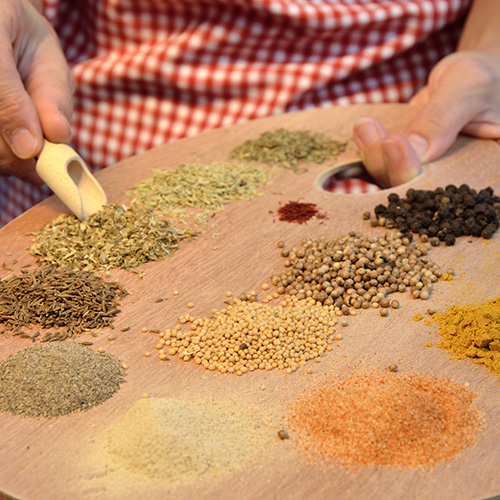
In cooking, choosing quality spices is crucial for successful, flavorful recipes. But did you know that the grinding of spices directly influences the taste and final texture of your dishes? Whether your spices are coarsely ground, finely ground, or simply crushed, each option plays a specific role in your preparation.
Coarsely ground spices: Texture and assertive flavors
Coarse grinding is ideal for adding texture and slowly releasing aromas. For example, coarsely ground black peppercorns or cumin seeds preserve their intact flavor during slow cooking, such as stews or marinades. This allows a gradual diffusion of aromas, bringing an intense, rustic, and authentic taste to your dishes.
Finely ground spices: Rapid and even diffusion
Fine grinding ensures immediate and even flavor diffusion. Finely ground spices, such as sweet paprika or ground cinnamon, quickly penetrate foods and easily incorporate into liquid or creamy preparations. They are perfect for quick preparations or dishes requiring a uniform and subtle flavor, such as sauces, soups, or pastries.
Crushed spices: The ideal compromise
Crushed spices represent an excellent compromise between the two previous options. Crushing spices, such as coriander or juniper berries, releases their essential oils without completely losing their integrity. They offer a pleasant crunchy touch while gradually diffusing their flavors, ideal for seasoning your homemade sausages or artisanal charcuterie preparations.
Choose natural spices for optimal quality
To fully enjoy these benefits, always prefer high-quality natural spices, such as those offered by Cebonat. For example, our black, gray, or white peppers bring exceptional aromatic finesse and power. A carefully selected natural spice guarantees not only an authentic taste but also incomparable freshness.
Practical tips for using your spices
Prefer to grind your spices at the last minute to preserve all the aromas. Store your spices away from light and moisture. Adjust the grinding according to the cooking time and type of preparation.
Suitable grinding for enhanced flavor
The grinding of your spices, therefore, plays an essential role in the success of your recipes. By judiciously choosing coarse, fine, or crushed grinding, you maximize the flavors and textures of your dishes. Discover a premium selection of natural spices at Cebonat to enhance your culinary creations.
How to choose quality, natural spices for my charcuterie ?

The success of good artisanal charcuterie lies not only in the quality of the meat and casings but also in the meticulous selection of the spices used. At a time when consumers are particularly wary of additives and chemical preservatives, it is essential to choose natural, authentic spices with transparent origins.
Why prioritize natural spices in charcuterie?
Natural spices are essential for obtaining charcuterie with an authentic taste while respecting consumer health. By avoiding industrial blends, you guarantee not only better flavor but also increased food safety.
How to recognize quality spices?
Several criteria help you determine the quality of a spice:
* Certification and labeling: Prefer certified organic products or those with recognized labels that ensure, among other things, the absence of pesticides.
* Freshness and integrity of the product: Check the appearance and aroma of the spices, revealing signs of a recent harvest and a well-preserved product.
* Composition: Ensure that the composition of spice blends (like single spices) is clearly listed on the product description; ingredients must be listed in descending order of quantity.
The guarantees offered by Cebonat
At Cebonat, we emphasize quality, naturalness, and professionalism. We exclusively offer natural spices, carefully selected for their authenticity and purity. Our products come from reliable suppliers committed to a responsible and sustainable approach. Each spice undergoes rigorous control to ensure perfect traceability from field to plate.
Our recommended natural spices for your charcuterie
Among our selection, discover, for example, our traditional blend for country pâté and liver pâté, specially developed to bring an authentic flavor to your preparations. Composed of natural ingredients, it is guaranteed without preservatives or nitrites.
Practical tips for using your spices well
To fully enjoy the exceptional quality of our spices:
Store them away from light and moisture. Respect the recommended dosages to avoid masking the natural flavor of the meats. Combine spices according to traditions or experiment to create unique flavors.
Choose natural
Choosing natural spices means guaranteeing tasty, healthy charcuterie that respects your customers. At Cebonat, we are by your side to offer you the best ingredients and support you in your artisanal approach. Discover our complete range of superior quality spices now.
You can download our organic certification issued by ECOCERT - FR-BIO-01 here.
How to Check the Quality of a Casing Before Use
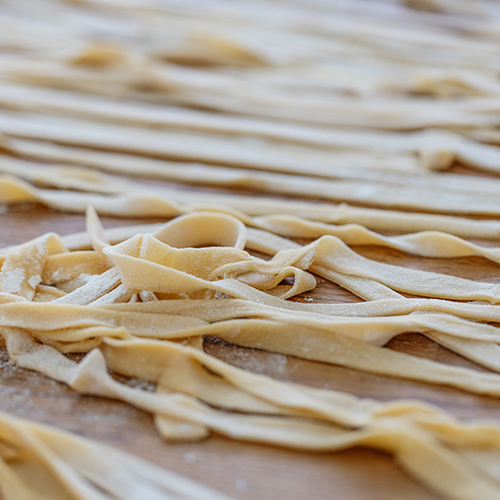
When preparing sausages, choosing a quality casing is essential to guarantee the success of your recipe. Contrary to popular belief, the only truly reliable method to check the quality of a casing is to select it by filling it with water (for sheep or pork casings) or air (for other casings). This step allows you to identify any leaks or weaknesses that could compromise the filling or cooking process.
Selection : The Only Reliable Method
Calibration serves above all to ensure the absence of holes and defects in the casing. Here's how to proceed if you want to check it yourself:
* Sheep or hog casings: With the help of a suitable tap, fill the casing with water, which will allow you to easily detect leaks, holes or walls that are too thin.
Then take the casing in your both hands and catch it between middle finger and ring finger and test the quality ( mechanical resistance ) by pinching the casing between the index finger and the thumb
This operation is as precise than technical and is generally reserved to specialists of casing selecting : the selectors
Other casings (beef, horse, etc.): Proceed as described above but use air (with a suitable pump or manually) to inflate them and identify any weak points.
In both cases, if the water or air does not escape and the casing maintains a homogeneous shape, this means that the product is of quality and ready to use.
However, in sheep casings, fine porosities are allowed if they are resistant to pressure (AAB Quality).
Trust Cebonat for Professional Calibration
At Cebonat, we have made calibration our priority: all our casings are systematically checked and verified before being put on sale. Our team of experts rigorously selects each batch of casings, then carries out the necessary tests to guarantee optimal performance and foolproof solidity. Thanks to this demanding process, you benefit from:
- A reliable product, without the risk of leaks or unexpected tears.
* A caliber that complies with the indicated standards, which facilitates the filling work and allows for even cooking.
* A time saving: no need to test the tightness of each casing yourself, we take care of it.
Why Invest in a Quality Casing?
The use of a good quality natural casing directly influences:
- Texture: a well-calibrated natural casing offers an ideal hold, both when filling and tasting.
* Taste: natural casings allow the meat to breathe and contribute to the authentic flavor of the sausage.
* Yield: a perfectly calibrated casing saves you time and limits waste.
Example: Sheep Casing 22/24 DEXTRA QUALITY (AAB)
Among our references, the Sheep Casing 22/24 DEXTRA QUALITY (AAB) perfectly illustrates Cebonat's commitment:
- Rigorous Caliber : a true 22/24 mm caliber, suitable for regular sausages and a filling without surprises.
* Strength and flexibility: checked by the water test, guaranteeing optimal resistance during filling.
* Ease of use: a quick soaking system (15 minutes) for a ready-to-use casing (casings in tins, untangled and in brine or on pipes).
With this casing, you can be sure of working with a safe product, ideal for professional or demanding amateur use.
Calibration and Confidence in a Specialist
The only effective method to check the quality of a casing before using it is to calibrate it by filling it with water or air, depending on its type. This step is essential to detect any imperfections that could harm your achievements. However, by using Cebonat, you have casings that are already checked, which saves you time and guarantees the success of your preparations. Thanks to the meticulous calibration carried out beforehand, you can cook with complete peace of mind and offer tasty and perfectly formed sausages.
Where to Buy Quality Natural Casings Online
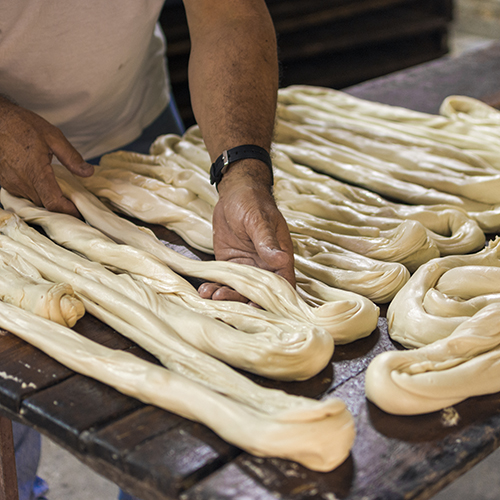
Buying quality natural casings is essential for making successful sausages, salami, and other homemade charcuterie preparations. Indeed, the quality of the casing directly influences the texture, flavor, and final appearance of the product. Faced with a growing supply on the online market, it is legitimate to wonder where to find the best casings to guarantee an optimal result. In this article, we offer some avenues for choosing and buying your natural casings with confidence, relying on the expertise of Cebonat, an online store specialized in the sale of natural casings and spices.
First of all, it is important to differentiate natural casings from those called "artificial". Unlike synthetic versions, our casings come from high-quality raw materials, from carefully selected breedings and processed with artisanal know-how.
This guarantee of traceability ensures not only their safety (no chemical additives) but also their resistance and authentic taste. When you buy your natural casings, always check that the supplier highlights this notion of traceability, a guarantee of a serious commitment to quality.
The caliber and type of casing (pork, beef, sheep, etc.) are important: a small sheep casing is perfectly suitable for chipolatas, while a pork casing is more suitable for Toulouse sausages. Make sure that this information is clearly indicated on the product sheet or in the online description. Cebonat offers a range of calibers adapted to various uses, in order to meet the expectations of amateurs as well as charcuterie professionals.
Beyond the typology, the question of hygiene and preservation often arises. Salted casings, for example, require rinsing and a fairly long soaking before use, then careful untangling, while desalted casings in brine should be briefly rinsed to remove excess salt and then used without prior soaking. If you are a beginner, look for a merchant who provides detailed instructions for use to facilitate your first achievements. At the same time, a specialized platform should provide you with clear recommendations on the best way to store and preserve your casings, in order to prolong their shelf life and freshness.
For a successful online purchase, pay attention to customer reviews and feedback on the store. This will give you an overview of the seller's reliability and the quality of their service. Cebonat is a specialist in this field, as well as in spices and charcuterie accessories. Do not hesitate to contact customer service before placing an order: a reactive reception and relevant advice are excellent indicators of the seriousness of the store.
Regarding the price-quality ratio, avoid turning to discounts or references that are too cheap. So-called "low-cost" casings can come from opaque channels and have defects (risk of tears, uneven quality, inaccurate caliber and/or footage). By investing in "premium" guaranteed products, you are choosing better cooking resistance and an authentic taste, worthy of charcuterie traditions. Cebonat is committed to offering reliable and natural solutions, without compromising on quality.
We also offer spices adapted to the making of your sausages and charcuterie. The combination of casings and carefully selected spice blends makes it possible to simplify your purchasing experience, while ensuring a perfect match between the support (the casing) and the flavors you wish to develop.
Finally, delivery is a significant criterion when you buy your casings online. Make sure that the announced deadlines are reasonable and that the packaging is designed to preserve the integrity of the product during transport. We ensure that we comply with safety and hygiene standards to guarantee that your order is received in optimal conditions.
The acquisition of quality natural casings online is based on several criteria: origin, traceability, transparency of the store, variety of the offer, customer service, and transport hygiene. Choosing a specialized supplier such as Cebonat will allow you to benefit from professional support and irreproachable products to make your sausages, salami, andouilles or black puddings. By turning to a site with a solid reputation and focused on quality, you maximize your chances of success in making tasty and authentic charcuterie preparations.
How to Store Natural Casings ?
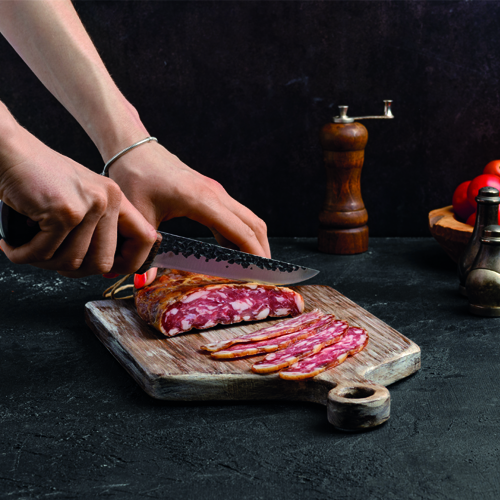
Proper storage of natural casings is crucial to maintain their quality and durability. Primarily used for sausage making, natural casings are derived from animal sources such as pork, sheep, and beef. Due to their natural origin, they require specific storage conditions to preserve their unique properties. Cebonat, a specialist in natural casings, offers practical advice to ensure optimal storage of your products.
Methods for Storing Natural Casings
There are two primary methods for preserving natural casings: saturated brine and dry salted. These methods help maintain the freshness and quality of the casings while preventing spoilage.
1- Preserving Casings in Saturated Brine
Saturated brine is a highly concentrated salt solution that preserves natural casings through a dehydration process. By immersing the casings in this solution, the growth of microorganisms is inhibited while maintaining their flexibility. For optimal storage, it is recommended to keep the casings at a maximum temperature of 15°C (59°F). During transportation. The casings can withstand ambient temperatures, facilitating logistics.
2- How to Resalt Casings
[
]Practical Tips
To maximize the shelf life of your natural casings, consider the following additional recommendations:
* Handle casings with care: Avoid exposing them to extreme temperatures for prolonged periods.
* Rinse casings before use: This will remove excess salt or brine and restore their flexibility.
* Adhere to storage conditions: A cool, dry environment is essential for preserving their quality.
At Cebonat, we are committed to providing you with high-quality natural casings sourced from carefully selected suppliers. Our dedication to natural products and quality drives us to offer you impeccable products, along with tailored storage advice to meet your specific needs.
Pitfalls to Avoid When Choosing Natural Casings

Choosing the right natural casings for your charcuterie is a crucial step that directly influences the quality of the final product. At Cebonat, we are committed to providing you with the highest quality casings, but it is essential to know how to choose them correctly. Here are the main pitfalls to avoid when selecting your natural casings.
1- Not verifying the origin of the casings
One of the first aspects to consider is the origin of the casings. Not all casings are created equal, and the origin can have a significant impact on quality. Prefer casings whose origin is clearly identified and that come from reputable sources. At Cebonat, we guarantee complete traceability of our products, ensuring that you obtain casings from respectful and high-quality practices.
2- Ignoring the quality of the preparation
The preparation of casings is another key step. Poorly prepared casings can lead to poor results, affecting the texture and taste of your charcuterie. Make sure to choose natural casings that have been properly prepared, washed, and salted for optimal preservation. Cebonat is committed to offering carefully prepared casings, ready to use.
3- Confusing natural and artificial casings
It is essential not to confuse natural casings with artificial casings. Artificial casings, often made of collagen or plastic, may be cheaper but do not offer the same quality or benefits as natural casings. Cebonat's natural casings, on the other hand, are 100% natural, offering an incomparable texture and flavor.
4- Underestimating the importance of size
The caliber of the casings is another crucial aspect to consider. Choosing an unsuitable caliber can compromise the manufacturing process and the final product. It is important to know your needs and select the caliber that best suits your recipe. At Cebonat, we offer a wide range of calibers to meet all your requirements.
5- Not taking into account the storage conditions
Finally, the storage conditions of the casings are often overlooked. Poorly stored casings can deteriorate rapidly, making them unusable. Be sure to follow the storage instructions, especially in terms of temperature and humidity. Cebonat provides you with casings with precise advice for optimal storage.
Choosing natural casings requires attention and knowledge. By avoiding these pitfalls, you ensure that you select quality casings that will make all the difference in your charcuterie. Trust Cebonat to guide you in this essential choice.
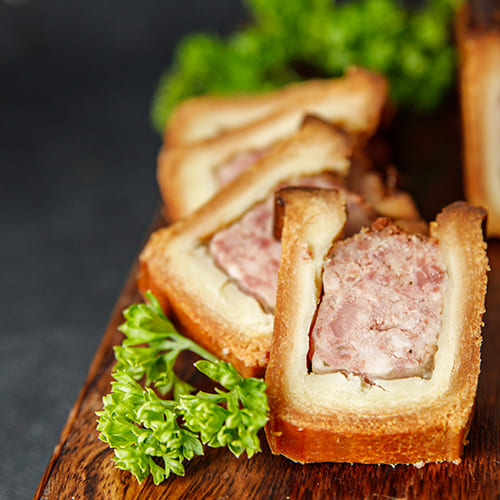
Welcome to Cebonat, your online store specializing in the sale of natural casings and quality spices. Today, we offer you an authentic recipe for homemade pâté en croûte, perfect for treating your guests to a homemade dish with unparalleled flavors.
Ingredients
- 450 g pork meat
- 550 g veal meat (or chicken or duck)
- 25 g Terrine de La Forêt
- 2 whole eggs
- 1 tablespoon cornstarch
Instructions for making a pâté en croûte
- Trim the pork and veal with a good boning knife
- Then chop these meats
- Mix all the meats by incorporating 25 g of Terrine de la Forêt diluted in the 2 eggs and the tablespoon of cornstarch
- Mix vigorously to obtain a homogeneous mixture.
- Prepare a puff pastry the day before.
- Roll out the puff pastry on a flat surface and arrange the meat lengthwise
- Close the puff pastry and place in a well-buttered mold.
- Place the pâté en croûte upside down in the mold, making sure that the pastry joints are at the bottom.
- Make two holes on the top of the dough to allow for evaporation during cooking.
- Cook at 140°C for a variable time depending on the size of your pâté. Prefer long cooking at a moderate temperature.
- At the end of cooking, when the internal temperature reaches 80°C, remove the pâté from the oven, brown it with an egg yolk and return it to the oven for 10 minutes at 180°C.
Even more pleasure with homemade pâté en croute!
To vary the pleasures, you can use our "pâté de campagne" spice and add 2 to 3 tablespoons of cognac or armagnac to your meat preparation. The most gourmets can incorporate a medallion of foie gras into the stuffing.
By following this recipe, you will obtain a delicious homemade pâté en croûte, ideal for a tasting with friends or family. Do not hesitate to explore our shop to discover our natural casings and quality spices, and to share your creations with us on social networks!
Enjoy!
How to Make Homemade Dry Sausage
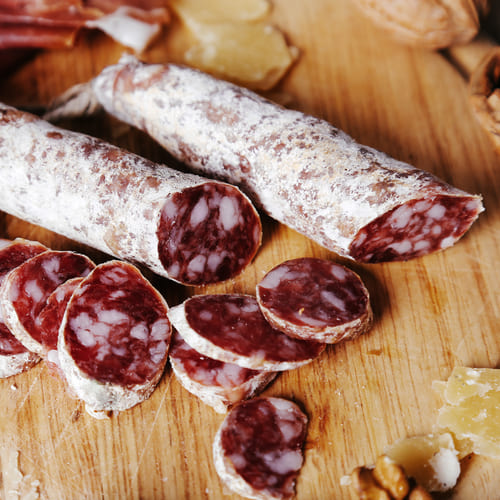
Making dry sausage and dry sausage at home is an art that combines tradition, patience, and passion. Starting with simple ingredients, like the Toulouse sausage recipe, you can create delicious and healthy sausages.
To get started, you will need quality ingredients: pork belly and shoulder, salt, pepper, and, most importantly, natural casings. Preparing the casings is a crucial step; after being desalted in cold water, they should be soaked in warm water to become supple.
Once you have chopped your meat and weighed your spices, stuff everything into the prepared casings. The stuffing should be very tight to avoid air pockets, but if you find any, pierce them gently with a sausage pricker.
The drying stage is influenced by your climate. If you live in a dry area, the process is straightforward. In more humid areas, pre-drying may be necessary to ensure optimal drying.
How to succeed in drying dry sausage? It's easy, just follow the guide!
Drying: Place the sausages in a warm and humid environment (ideally between 20°C and 22°C with a humidity of 80-90%) for 24 to 48 hours. This step promotes the development of a protective outer layer.
Drying: Transfer the sausages to a cool, well-ventilated place to dry for several weeks (3 to 10 weeks depending on the size of the casing).
Creating your own charcuterie offers incomparable satisfaction. By following these tips, even beginners can make delicious dry sausage and dry sausage, while controlling the ingredients for a healthier option.
For those who want to embark on the adventure of homemade charcuterie, our full mix pack is the ideal tool to get started. Designed to produce between 5 and 8 kg of dry sausage or dry sausage, this kit contains everything you need, except for the meat. You will find 9 meters of pork casings for dry sausage or 20 meters for dry sausage, as well as a 200g tub of our complete spice mix, specially prepared to ensure a rich and authentic flavor to your creations. Perfect for appetizers, this pack will allow you to savor the fruits of your labor with pride.
Natural casings: what are they and how are they made?
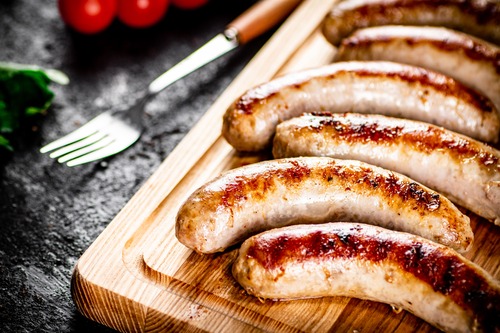
Natural casings, used in the production of sausages and other charcuterie, mainly come from the intestines of pigs, sheep, and beef. At Cebonat, we make a point of honour of selecting superior quality natural casings, thus guaranteeing the authenticity and taste of your preparations.
The manufacturing process of natural casings
The manufacturing of natural casings is an art that requires precision and know-how. Each step of the process is carried out with the utmost care to guarantee the quality and safety of the product.
After a clever selection, the casings are carefully scraped to remove any impurities. This first step is crucial and requires a high level of skill and expertise.
Once cleaned, the casings are then selected to sort the different diameters (the caliber), the mechanical strengths, and the degree of porosity (the quality). They will then be measured in hanks, bundles, etc. and then used for their final use (put in untangled brine pots, piped on hard or soft tubes or simply packed dry salted in bags).
CEBONAT only offers you top-of-the-range 1st Choice (IA Quality) or AAB casings for sheep casings.
The casings are then salted and/or placed in a saline solution: brine, an essential step for their preservation. This process is not only a guarantee of food safety, but also contributes to the distinctive texture and taste of sausages made with these casings.
Our sheep casings 22/24 DEXTRA QUALITY are perfect for thin sausages such as chipolatas and merguez, offering excellent resistance and very long lengths for maximum yield. The casings in pots or on pipes are ready to use after only 15 minutes of express soaking, saving you valuable time in your manufacturing process.
For people who do prefer thicker sausages our hog casings 30/32 Pork Casings are ideal for Toulouse sausage, blood sausage, and many others.
Supplied in a reusable airtight food box, they guarantee irreproachable quality for all your preparations.
And for those who wants to specialize in dry sausage, the Beef middles 50/55 are the choice per excellence . They are of the highest 1st quality and are ideal for making homemade dry sausage, garlic sausage, cervelas, and more, without holes and well degreased for superior quality.
If you are curious to learn how to choose the best casings for your sausages, we invite you to consult our dedicated article: How to choose the best sausage casings
Comment rendre une viande plus tendre avec une marinade ?
La clé pour une viande juteuse et tendre réside souvent dans la préparation. Une bonne marinade, enrichie d'épices de qualité, peut transformer même les coupes les plus robustes en délices fondants. Chez Cebonat, nous comprenons l'importance des ingrédients naturels pour rehausser les saveurs sans masquer la qualité de votre viande.
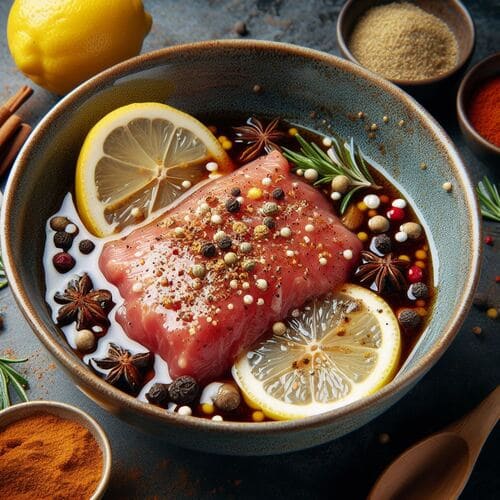
Notre gamme de produits pour marinades et grillades s'enrichit de nouveautés exquises, conçues pour éveiller vos papilles et magnifier vos préparations culinaires.
Mélange d'Épices pour Marinades et Grill Thym Citron
Découvrez le Mélange d'Épices pour Marinades et Grill Thym Citron, une harmonie parfaite entre la fraîcheur du thym et l'acidité du citron, sans allergènes ni conservateurs. Idéal pour mariner ou saupoudrer sur vos poissons, crevettes, viandes blanches et volailles, ce mélange vous promet une expérience gustative légère et raffinée. Ajoutez-y un peu d'ail en poudre ou du poivre pour rehausser les saveurs selon vos goûts. Disponible en sachets fraîcheur individuels re-soudables de 200gr, nos épices haut de gamme garantissent une qualité et une fraîcheur inégalées.
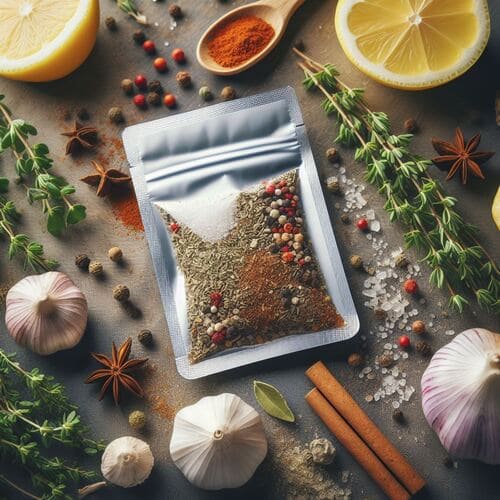
Délicieux Mélange Complet d'Épices Grill Mexicain
Égayez vos grillades avec le Délicieux Mélange Complet d'Épices Grill Mexicain, un assortiment savoureux de paprika, poivron et oignons, rehaussé d'une touche unique Cebonat. Doux et rond, ce mélange séduira petits et grands, sans piquer. Parfait pour une marinade ou un saupoudrage avant de passer au grill, il est présenté dans un sachet fraîcheur re-soudable, pour une conservation optimale.

Mélange Complet d'Épices pour Marinade Viandes Rouges
Le Mélange Complet d'Épices pour Marinade Viandes Rouges transformera vos kebabs, viandes rouges et magrets de canard en chefs-d'œuvre culinaires. Ce mélange relevé, à base d'herbes, d'oignons et d'autres épices soigneusement sélectionnées, est parfait pour une marinade ou un saupoudrage direct. Il vous est proposé dans un conditionnement pratique pour préserver sa fraîcheur et son intensité.
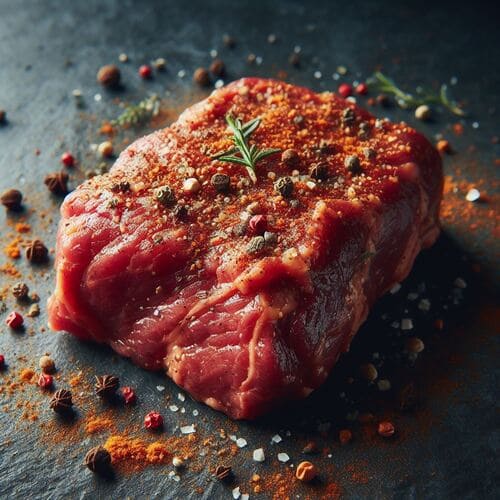
Pinceau à Marinade 40cm
Pour une application parfaite de vos marinades, découvrez notre Pinceau à Marinade de 40cm. Pratique et sûr, avec son manche en ABS et ses poils en silicone, il vous permet d'étaler uniformément vos marinades sans risque de brûlures. En bonus, ce pinceau vous est offert pour tout achat d'un assortiment de 1kg d'épices à marinade chez Cebonat. Résistant jusqu'à 100°C, il est également compatible avec le lave-vaisselle pour un nettoyage facile.
Les secrets d'une marinade parfaite
Pour une marinade réussie, l'équilibre est essentiel. L'acidité, provenant d'ingrédients comme le citron ou le vinaigre, commence le processus d'attendrissement. Les épices, quant à elles, infusent la viande de saveurs qui complimenteront votre plat final. Chez Cebonat, chaque épice est sélectionnée pour sa fraîcheur et son authenticité, garantissant un résultat qui ravira vos papilles.

Pour plus de conseils sur la préparation de vos viandes et l'utilisation optimale des épices, visitez notre blog et découvrez un monde de saveurs.
How to Make Your Own Homemade Charcuterie with Cebonat

Discover the pleasure of making your own charcuterie at home with Cebonat. We guide you through the essential steps, using high-quality natural casings and selected spices to guarantee a tasty and authentic result.
Choosing the Right Casings
The selection of casings is a fundamental aspect of making homemade charcuterie. At Cebonat, we offer a variety of premium natural casings, including sheep casings, hog casings, beef casings, and horse casings, each suited to specific types of sausages, salamis, and charcuterie.
Sheep casings are perfect for thin sausages such as mild chipolatas, spicy merguez, and frankfurters, offering a delicate texture and a fine taste. Hog casings, on the other hand, are ideal for a wider variety of sausages, ranging from Toulouse sausages, white or black pudding to tasty salamis, thanks to their versatility and robustness. For preparations requiring a more resistant casing, such as certain dry or cooked salamis, beef casings are essential, known for their strength and ability to retain aromas. You can also easily make beautiful and tasty andouille with horse casings.
Choosing high-quality casings from a professional like Cebonat ensures natural products, free from chemical or artificial treatments. We take care to select, calibrate, and prepare our casings with the utmost care, guaranteeing their taste qualities and natural integrity. This rigor in the choice and preparation of casings makes all the difference in the final result of your homemade charcuterie.
By choosing Cebonat, you benefit not only from the highest quality casings but also from expert advice to select the most suitable casing for each type of sausage. Our commitment to excellence ensures an authentic and successful culinary experience every time.
The Composition and Use of Spices
Cebonat excels not only in supplying natural casings but also in creating unique spice blends to enhance your homemade charcuterie. Discover our complete blends for pâtés and stuffings, designed to bring a delicious and authentic touch to your culinary creations.
Spice Blend for Country Pâtés and Liver Mousses
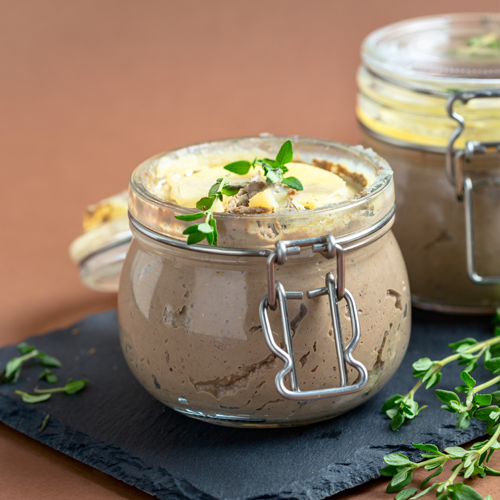
This blend of aromatic spices, without nitrites and with salt, is perfect for flavoring your country pâtés and liver mousses. Sold in various quantities, it is packaged in resealable freshness sachets for optimal use. With only 25g per kg of mixture, this blend enriches your pâtés at a very economical cost.
Key ingredients: Salt, dextrose, dried vegetables (garlic, shallot, onion), spices, monosodium glutamate, cochineal color.
This nitrite-free blend is ideal for creating a flavorful liver mousse. To prepare, combine 25g of our spice mix with 500g of poultry liver (or pork liver) and 500g of pork fatback. Add 2 whole eggs and a generous tablespoon of cornstarch (or directly 10g of our Supreme Binder).
For a more customized flavor, consider adding garlic granules and/or chopped shallot. Blend the mixture until it reaches a smooth consistency. Then, cook it over low heat. Allow it to cool completely and refrigerate overnight before serving.
Spice Blend for Wild Boar and Venison Pâtés
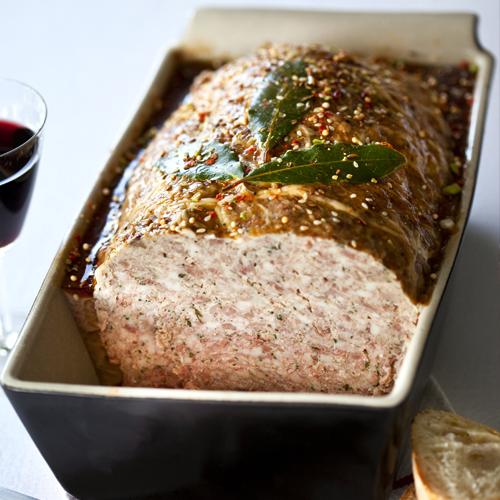
Specially designed for game pâtés such as wild boar and venison, this blend offers a harmony of deep and rustic flavors. Available in trays adapted to different quantities of preparation, it guarantees freshness and an exquisite taste to your pâtés.
Key Ingredients: Salt, dextrose, dried vegetables (garlic, shallot, onion), spices, monosodium glutamate, cochineal.
Perfect for a rich and flavorful wild boar pâté. Combine 25g of the spice blend with 700g of minced wild boar and 300g of pork belly or pork collar. Add 2 whole eggs and a generous tablespoon of cornstarch (or 10g of our Supreme Binder). You can enhance the flavor with a splash of Armagnac. Place in a terrine and cook in a bain-marie (water bath) for approximately 1 hour and 30 minutes at 160°C (320°F).
Complete Kit for Deliciously Garlicky Stuffing
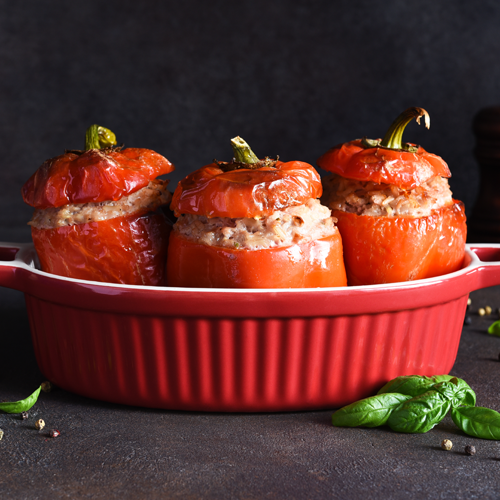
This complete kit is your ally for making exceptional stuffings, ideal for stuffed tomatoes, fresh sausages like Toulouse or Chipolata, and even garlic sausage. It includes a spice blend for natural sausage, fine garlic granules, organic Provençal herbs, and parsley flakes, offering incomparable flexibility and richness of flavor.
Tips and Tricks
Discover all our tips for successful homemade charcuterie. From storing casings to choosing the best spices, Cebonat is your ideal partner for a rewarding culinary experience.
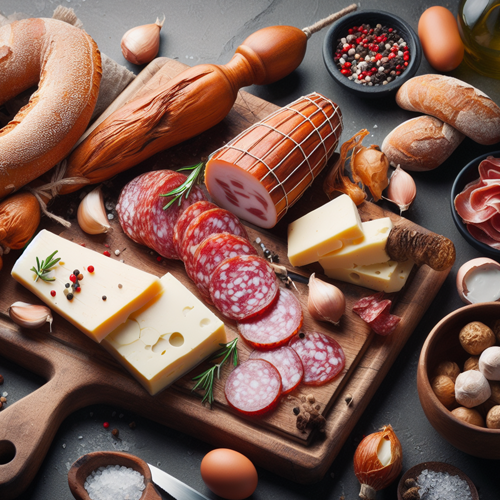
Les Bienfaits pour la Santé des Épices de Cebonat
Les épices sont un trésor de bienfaits pour la santé. Chez Cebonat, nous proposons une gamme d'épices sans allergènes et sans nitrites pour vos saucisses sèches, pâtés de gibier et merguez, qui sont non seulement savoureuses mais aussi bénéfiques pour votre santé.
Épices pour Saucisses Sèches : Un Mélange Sain et Savoureux

Notre mélange complet d'épices pour saucisses sèches est conçu pour rehausser le goût de vos charcuteries maison sans l'utilisation de colorants ou d'allergènes. Composé de sel non iodé, sirop de glucose, épices naturelles, et stabilisants, ce mélange permet de créer des saucisses sèches et saucissons secs maison avec une saveur authentique. L'absence de colorants assure une couleur naturelle à vos charcuteries, tandis que les antioxydants comme l'E300 préservent leur fraîcheur et leurs bienfaits nutritionnels.
La composition unique de notre mélange d'épices favorise non seulement un goût exceptionnel mais contribue également à une alimentation saine. Le sel non iodé est choisi pour son absence d'additifs, fournissant un assaisonnement naturel sans impacter négativement la santé. De plus, le sirop de glucose dans notre mélange ajoute une touche de douceur naturelle sans les effets négatifs des sucres raffinés.
Les épices naturelles sélectionnées dans notre mélange apportent non seulement des saveurs riches et variées, mais possèdent également des propriétés bénéfiques pour la santé. Des études ont montré que certaines épices peuvent avoir des effets anti-inflammatoires, antioxydants, et même antimicrobiens. Ces épices contribuent à la création de saucisses sèches non seulement délicieuses mais également bénéfiques pour le bien-être général.
En outre, l'utilisation de stabilisants comme l'E450 et l'E451 dans notre mélange garantit la qualité et la sécurité des saucisses sèches. Ces stabilisants aident à maintenir la texture et la cohérence des saucisses pendant le processus de séchage. Ils jouent un rôle crucial dans la préservation de la qualité des protéines et des graisses dans la viande, garantissant que chaque bouchée de saucisse sèche est aussi bonne que la première.
Enfin, l'absence de colorants artificiels dans notre mélange d'épices est une caractéristique clé pour ceux qui cherchent à éviter les additifs inutiles dans leur alimentation. En choisissant notre mélange d'épices pour vos saucisses sèches, vous optez pour une option plus naturelle et saine, sans compromettre le goût ou la qualité de vos charcuteries maison.
Les Épices pour Pâtés de Gibier : Riches en Saveurs et Bienfaits
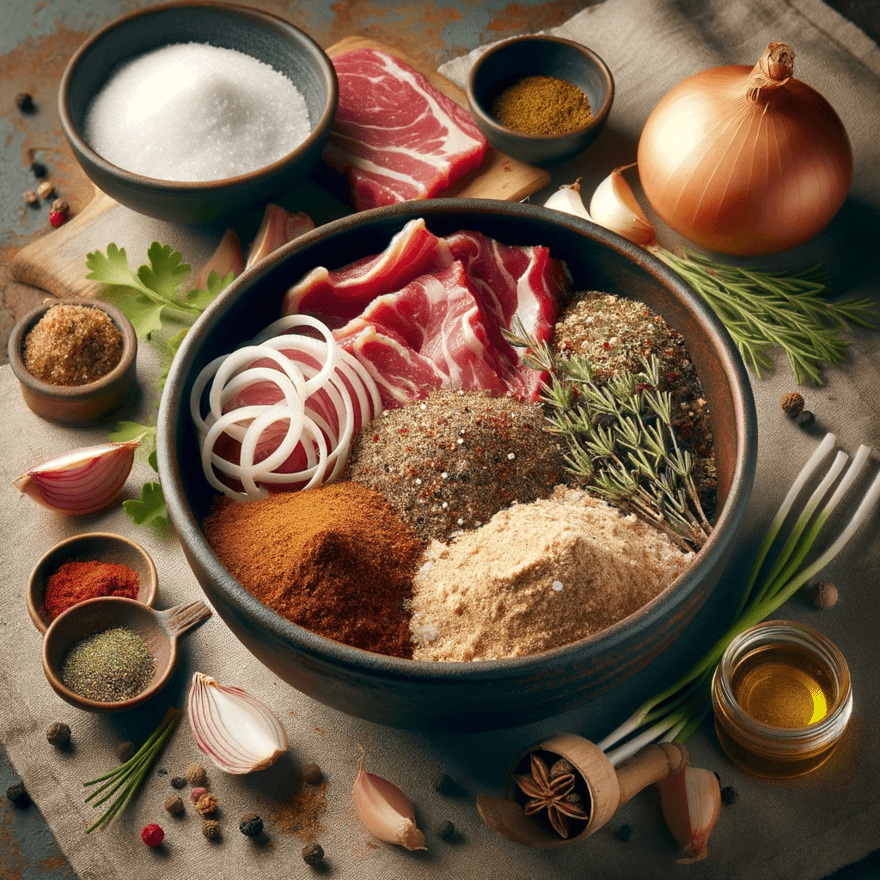
Le mélange d'épices pour pâtés de gibier de Cebonat, sans nitrites, est idéal pour une alimentation saine. Il contient des légumes séchés (aïl, échalote, oignon), épices naturelles, et un exhausteur de goût pour enrichir vos pâtés de sanglier ou de chevreuil. Cette composition riche en goût et en nutriments apporte une dimension supplémentaire à vos préparations, tout en soutenant une bonne santé grâce à ses ingrédients naturels.
Ce mélange d'épices est conçu pour offrir un équilibre parfait entre saveur et bien-être. Les légumes séchés comme l'aïl, l'échalote et l'oignon apportent non seulement un goût profond et riche, mais sont également connus pour leurs nombreux bienfaits pour la santé. L'aïl, par exemple, est réputé pour ses propriétés antibactériennes et antioxydantes, tandis que l'échalote et l'oignon offrent des composés soufrés bénéfiques pour le cœur.
La présence de sel et d'exhausteur de goût dans le mélange d'épices assure que chaque bouchée de votre pâté de gibier est délicieusement assaisonnée. Tandis que le sel joue un rôle crucial dans la conservation et l'amélioration du goût, l'exhausteur de goût, comme le glutamate monosodique, rehausse les saveurs naturelles des ingrédients, créant une expérience gustative riche et satisfaisante.
Les épices naturelles incluses dans le mélange ont été soigneusement sélectionnées non seulement pour leur goût exceptionnel, mais aussi pour leurs propriétés antioxydantes et anti-inflammatoires. Ces épices ajoutent une complexité de saveur à vos pâtés de gibier, tout en apportant des avantages pour la santé, tels que la réduction du risque de maladies chroniques et l'amélioration de la digestion.
Enfin, l'absence de nitrites dans notre mélange d'épices est une décision délibérée pour promouvoir une alimentation plus saine. Les nitrites sont souvent utilisés dans les produits de charcuterie pour leur couleur et leur conservation, mais ils peuvent être source de préoccupations pour la santé. En choisissant notre mélange d'épices sans nitrites pour vos pâtés de gibier, vous faites un choix conscient pour le bien-être de votre famille, sans sacrifier le goût ou la qualité.
Merguez Tradition d'Orient : Un Mélange Épicé et Bienfaisant

Notre mélange d'épices pour Merguez Tradition d'Orient est parfait pour ceux qui cherchent à combiner saveur et santé. Sans allergènes et modérément épicé, il convient à tous les palais. Ce mélange offre un goût inimitable et fabuleusement épicé pour vos merguez, tout en préservant les bienfaits naturels des épices utilisées. Pour ceux qui préfèrent une saveur plus relevée, l'ajout de notre piment extra fort est une option disponible.
Ce mélange exclusif de Cebonat est une fusion de traditions et de modernité. Les épices soigneusement sélectionnées apportent non seulement une saveur riche et authentique, mais elles sont également chargées de propriétés bénéfiques pour la santé. Les ingrédients comme le piment, utilisé avec modération dans notre mélange, sont connus pour leurs effets stimulants sur la circulation sanguine et le métabolisme.
En plus de leur contribution gustative, ces épices jouent un rôle important dans la digestion. Elles facilitent le processus digestif et peuvent aider à réduire les problèmes gastro-intestinaux. Leur nature modérément épicée garantit que ces bienfaits sont accessibles sans être accablants, même pour ceux qui ne sont pas habitués aux saveurs fortes.
Notre mélange d'épices pour merguez est également dépourvu de nitrites et d'allergènes, ce qui le rend adapté à un large éventail de régimes alimentaires et préférences. Cette absence d'additifs controversés et d'allergènes rend nos merguez non seulement délicieuses, mais aussi un choix plus sain pour vos barbecues et repas familiaux.
Enfin, pour les amateurs de saveurs plus intenses, notre piment extra fort disponible en option permet de personnaliser le niveau de piquant selon vos goûts. Cette flexibilité fait de notre mélange d'épices pour merguez un choix idéal pour explorer et apprécier la richesse des saveurs traditionnelles du moyen Orient, tout en profitant des bienfaits pour la santé des épices naturelles.
Natural vs. Artificial Casings: Why Tradition Often Prevails
The art of sausage-making, whether it’s merguez, dry sausages, or chorizo, often comes down to one crucial choice: the casing. Do natural casings always have an advantage over artificial ones? With our expertise at Cebonat, discover why so many connoisseurs trust natural casings.
The Role of Casings in Sausage Making
Casings play a crucial role in sausage making. More than just a container, casings influence texture, flavor, and even shelf life. When it comes to these qualities, natural casings often stand out.
The Origins of Casings
Natural casings, a heritage from our ancestors, come from animal intestines, such as pork, sheep, and cattle. After meticulous cleaning, they are preserved in salt or brine. They are at the heart of many culinary traditions around the world. In contrast, artificial casings, while practical, are a modern solution that doesn’t always capture the essence of tradition.
The Choice of Casings: A Preference for Tradition
Many butchers, loyal to tradition, turn to natural casings. Praised not only for their authentic flavor but also for allowing sausages to “breathe,” they’re especially preferred for sausages like dry sausages. Although artificial casings have their place, they’re often reserved for mass production or specific needs.
Each Casing Has Its Place
At Cebonat, we value quality. For an authentic experience, natural casings often hold the advantage. Your choice will reflect your needs and preferences.
Natural Casings: The Choice of Tradition
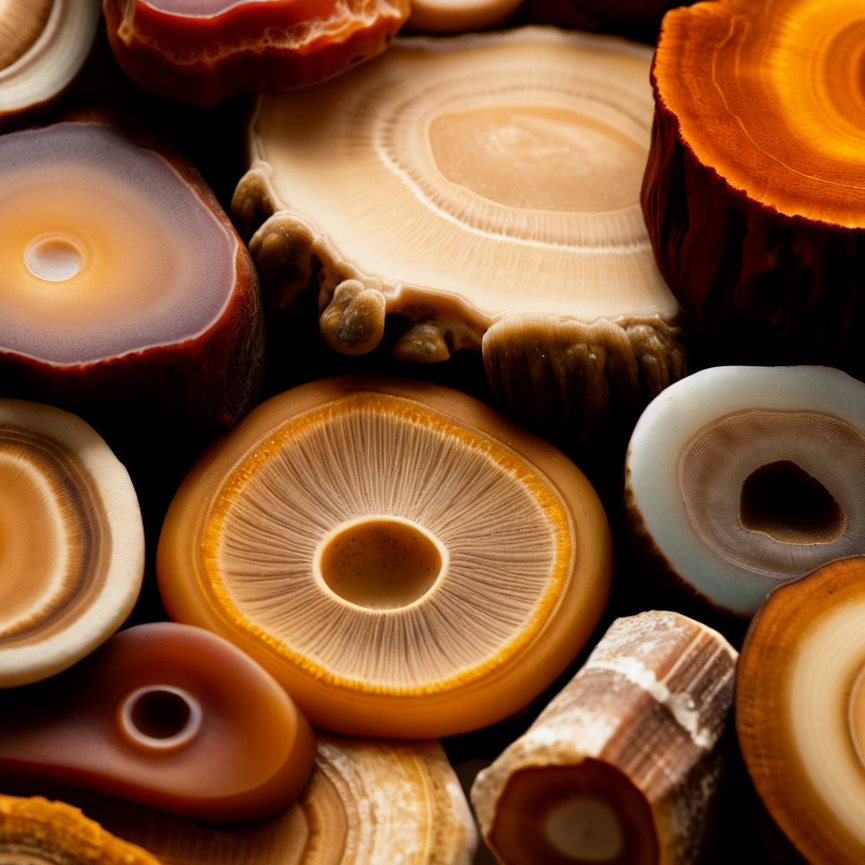
Natural casings are favored by many butchers for a reason: they offer an unmatched experience. Flavor, texture, crispness during cooking—all these make natural casings the ideal choice for those seeking quality.
Natural casings come from animal intestines, such as pork (pork casings), sheep (sheep casings), and cattle (beef casings). These casings are cleaned, treated, often with salt and/or brine, and then prepared for sausage making.
Their primary advantage is their authentic flavor and texture. Indeed, during cooking, they provide an incomparable taste and a crispy texture to sausages. Charcuterie enthusiasts often prefer them for these reasons.
The Traditional Preparation of Natural Casings
The preparation of natural casings is an ancient art, passed down through generations. After animal slaughter, intestines are carefully removed, scraped, washed, and repeatedly calibrated to remove any residue. After measurement (packed or bundled), they are then soaked in a saline solution to preserve and soften them, or drained and preserved in dry salt.
Environmental Respect
Using natural casings is also an environmentally respectful approach. By utilizing all parts of the animal, waste is minimized, contributing to a more sustainable and eco-friendly practice.
Variety and Flexibility in Production
Natural casings offer a wide range of sizes and diameters, allowing butchers to produce different types of sausages, from fine chipolatas to larger dry sausages. Furthermore, their natural elasticity provides better hold during stuffing, ensuring well-formed sausages.
Cultural and Regional Considerations
In many cultures worldwide, the use of natural casings is not only a tradition but also a sign of quality and authenticity. In some regions, festivities are even organized around sausage making, where choosing natural casings is crucial for preserving the authenticity of traditional recipes.
Tips for Handling Natural Casings
If you decide to use natural casings for your sausages, it’s essential to handle them carefully. Store them in a cool place and rinse with cold water before use. When making sausages, take the time to moisten them with warm water to facilitate stuffing and prevent tearing.
Artificial Casings: A Modern Alternative
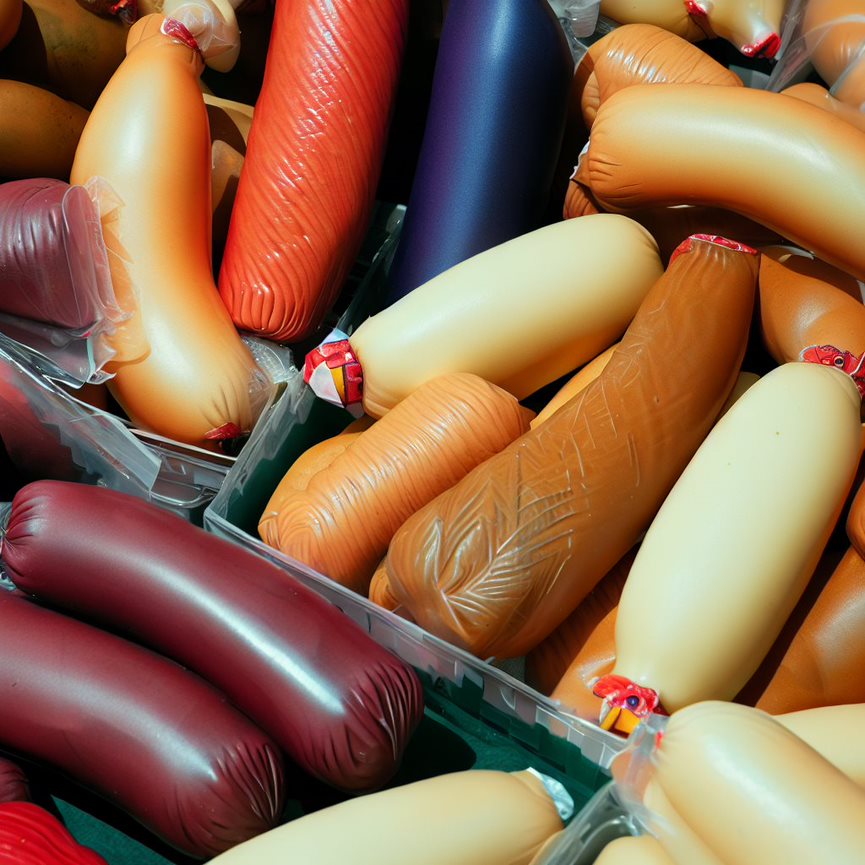
Artificial casings, while practical, are often a second choice for those seeking authenticity. However, they offer some advantages such as uniformity and ease of use.
Unlike natural casings, artificial casings are made from synthetic or processed materials. Several types exist: collagen casings, cellulose casings, polyamide casings, and vegetable casings. They’re often chosen for ease of use and uniformity.
While these casings don’t impart the characteristic taste of natural casings, they offer excellent hold during cooking and are ideal for those looking for sausages with uniform diameters, like one-meter sausages.
Types of Artificial Casings and Their Specificities
As mentioned, several types of artificial casings exist. Collagen casings (edible) are derived from animal proteins and are particularly appreciated for their strength and elasticity. They’re also valued for their translucent appearance, which gives sausages an attractive look.
Cellulose casings (inedible), on the other hand, are made from processed plant fibers. They’re often used for sausages that require casings to be easily removed after cooking, like some types of Frankfurt sausages.
Polyamide casings (inedible), a type of plastic material, are mainly used in the production of cooked sausages.
Finally, vegetable casings (edible) are made from plant-based materials. These casings are an ideal alternative for manufacturers who want to offer 100% vegetarian or vegan products.
Production Advantages
One of the main advantages of artificial casings is the consistency they offer in production. They enable fast and efficient production, ideal for industrial-scale manufacturing. Additionally, they present fewer breakage risks, ensuring minimal loss during the manufacturing process.
Economic Aspects
On an economic level, artificial casings can often be less expensive than their natural counterparts, especially in large quantities. This allows manufacturers to offer sausages at more competitive prices while maintaining certain quality standards.
Tips for Using Artificial Casings
When using artificial casings, it’s essential to follow the manufacturer’s instructions to ensure proper handling. For instance, some casings may require prior soaking, while others can be used directly. Additionally, depending on the casing type, it may be necessary to adjust cooking time and temperature for optimal results.
The Preference for Natural

While the choice between natural and artificial casings depends on your needs, natural casings often stand out for true sausage lovers. For an authentic, flavor-rich experience, natural is frequently the preferred option.
Cebonat offers a wide range of casings and spices, including spices for merguez, chipolatas, dry sausages, and chorizo to ensure the success of all your preparations. Don’t forget to check out our selection of homemade merguez spices for unparalleled flavor!
Whether you choose to buy sausage casings in supermarkets, from specialized retailers, or online, make sure to select quality products to achieve the best sausages possible.
Quels sont les meilleurs mélanges d'épices pour différents types de saucisses ?
La fabrication de saucisses est un art délicat, combinant boyaux, viandes et épices pour créer une symphonie de saveurs. Cebonat, expert en boyaux pour saucisse et épices, vous guide à travers ce monde savoureux en révélant les meilleurs mélanges d'épices pour chaque type de saucisse.
Épices pour Saucisson Sec ou Saucisse Sèche : Un Voyage Aromatique
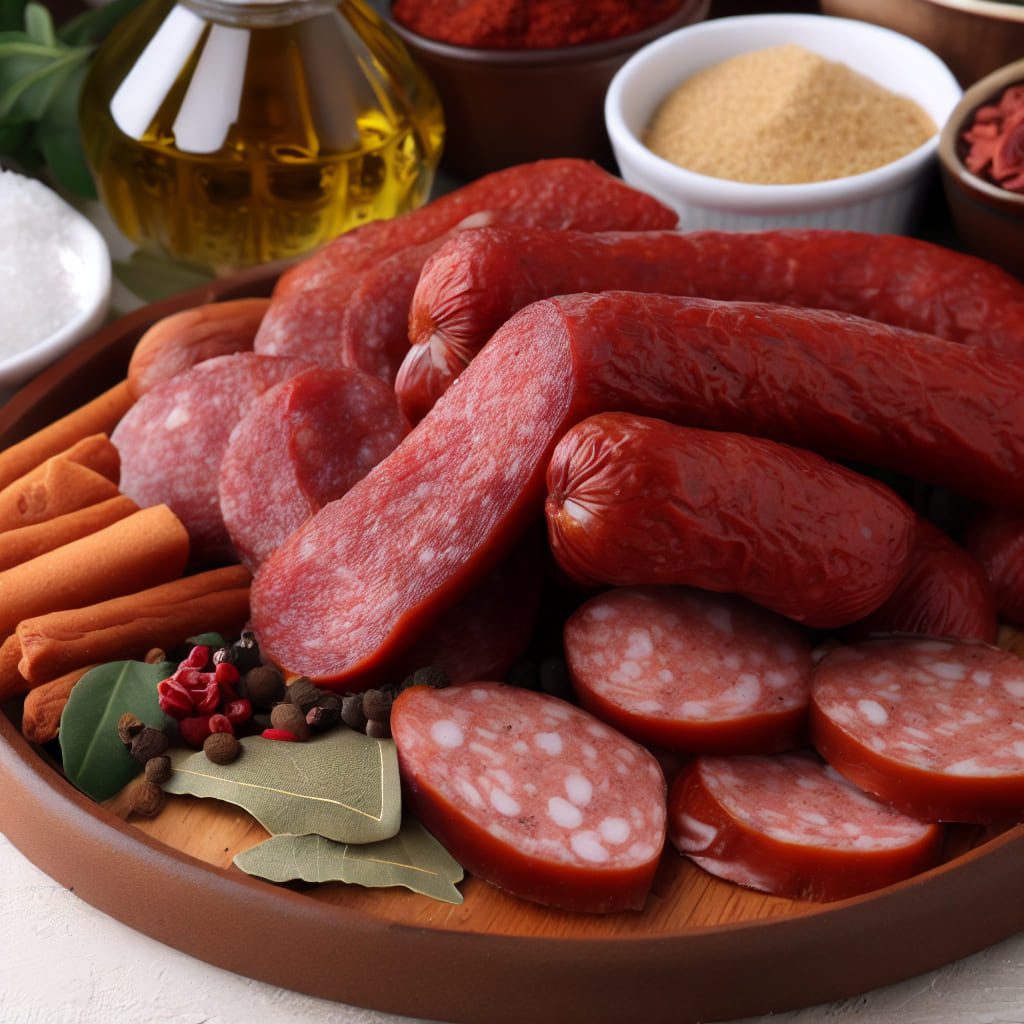
La confection de saucissons secs ou de saucisses sèches est un art culinaire qui requiert des ingrédients de qualité. Le mélange d'épices de chez Cebonat est idéal pour ceux qui souhaitent se lancer dans la fabrication de ces délices à la maison. Sans colorant et sans allergène, ce mélange aromatique rend le processus de fabrication simple et accessible à tous, sans besoin d'étuve ni de séchoir !
Avec le mélange complet d'épices Cebonat, vous n'avez qu'à hacher la viande, incorporer les épices, embosser sous boyau naturel et laisser sécher. En quelques jours pour une petite saucisse sèche et en deux mois pour un saucisson, vous pouvez déguster vos créations ! De plus, ce mélange vous permet de fabriquer environ 5kgs de saucissons ou saucisses sèches avec une barquette, et jusqu'à 25kgs par poche de 1kg.
Ce mélange est constitué d'ingrédients choisis pour leurs qualités gustatives et conservatrices, tels que le sel non iodé, le sirop de glucose, diverses épices, et l'huile végétale de tournesol. Et même sans colorant, garantissant une couleur légèrement pâle, le goût n'en est pas affecté.
Pour ceux qui aiment expérimenter, ce mélange sert de base parfaite. Vous pouvez personnaliser vos saucissons en ajoutant du poivre concassé, du mélange 5 baies, du fromage, des noisettes, ou tout autre ingrédient de votre choix. Mais pour commencer, un premier test avec notre délicieux mélange d'épices seul est recommandé!
Le mélange est conditionné en poches de 1kg dans son sachet fraîcheur re-soudable pour préserver sa fraîcheur dans le temps. Et pour ceux qui préfèrent les produits biologiques, une version bio est également disponible.
Explorez dès maintenant ce mélange complet d'épices et débutez votre aventure dans la fabrication de saucisses sèches ou de saucissons secs maison !
Chorizo Supérieur : Une Explosion de Saveurs
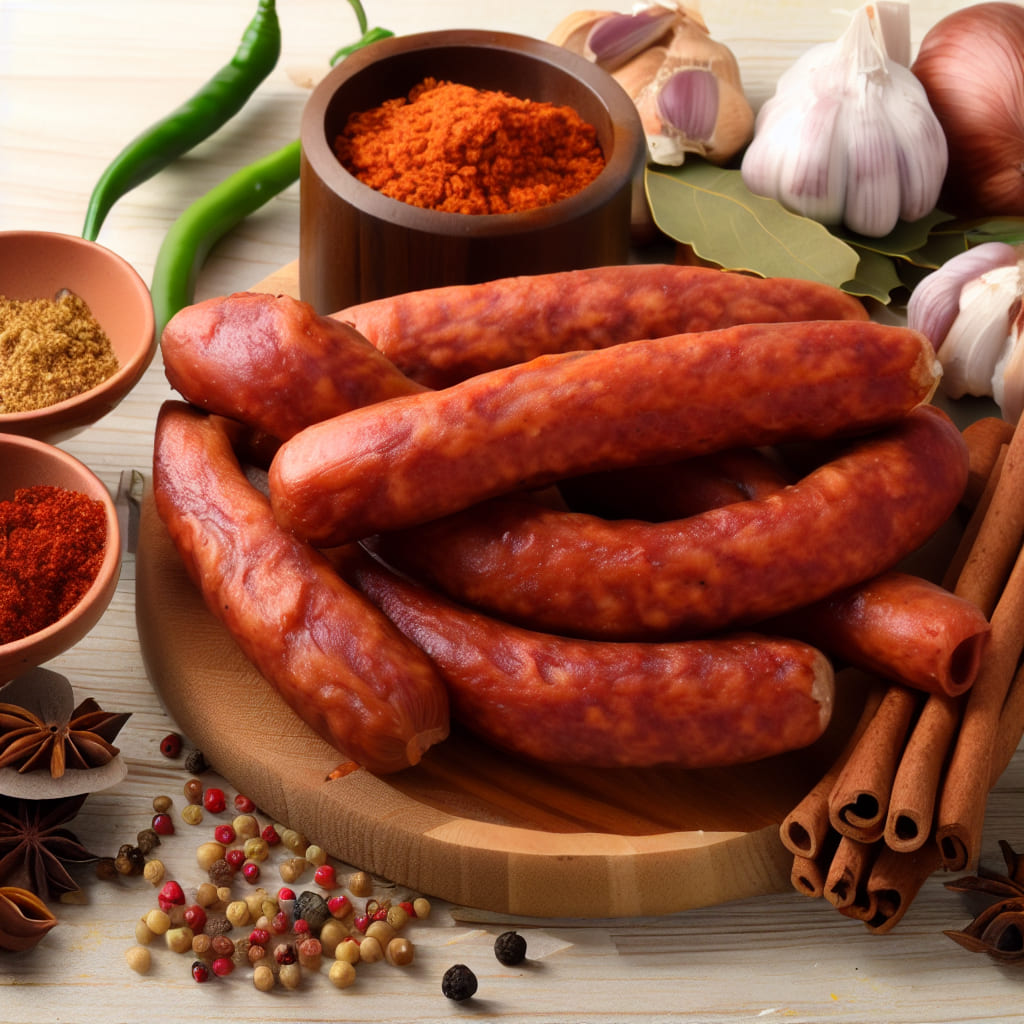
Le chorizo, un incontournable de la gastronomie espagnole, se distingue par sa saveur piquante et fumée. Le Mélange complet ÉPICES pour CHORIZO SUPÉRIEUR de Cebonat est l'allié idéal pour concocter chez vous un chorizo de qualité supérieure, qu'il soit sec ou frais. Ce mélange, sans allergène, est parfaitement équilibré pour offrir à votre chorizo un goût inimitable.
Adapté pour différentes viandes telles que le porc, le bœuf et le gibier, ce mélange réussit à satisfaire les palais les plus exigeants avec sa recette améliorée. Pour ceux qui souhaitent découvrir ce condiment savoureux, il est temps de déguster ce chorizo de qualité supérieure!
Le conditionnement est pratique, disponible en sachets fraîcheur re-soudables et en barquettes, permettant de préparer jusqu'à 5 kgs de saucisses. Pour ceux qui préfèrent le biologique, une version bio est également disponible. Et pour les amateurs de sensations fortes, il est possible d'ajouter à la recette notre piment extra fort pour un chorizo encore plus relevé.
Les ingrédients comprennent des épices et plantes aromatiques, du sel non iodé, du sirop de glucose, du dextrose, des arômes naturels, de l'acide ascorbique comme antioxydant et du salpêtre comme conservateur. Il est à noter que la dose d'emploi varie en fonction du type de chorizo préparé, étant de 90 gr/kg de mêlée pour le chorizo en saucisse saucisson sec et de 70 grs seulement pour le chorizo frais.
Pour les passionnés de la cuisine espagnole et les gourmets souhaitant intégrer le chorizo dans leurs plats cuisinés comme la paella, ou simplement pour le griller à la plancha ou à la poêle, le mélange d'épices pour chorizo supérieur de Cebonat est le choix par excellence pour un résultat gustatif optimal.
Commencez votre aventure culinaire espagnole avec les épices Cebonat et redécouvrez le vrai goût du chorizo!
Explorez la gamme complète de boyaux et épices Cebonat et commencez votre voyage gastronomique dès aujourd'hui !
Selecting Quality Sausage Casings to Suit Your Needs
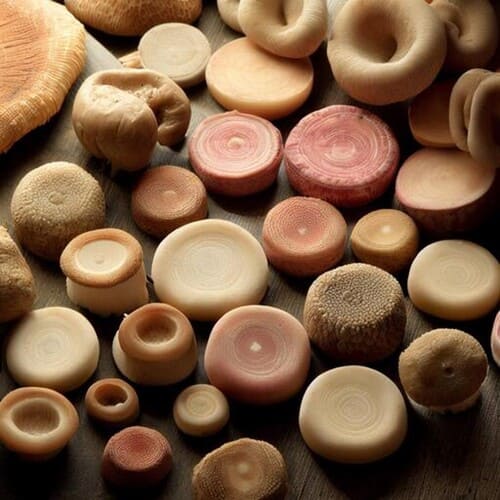
Choosing the right sausage casing can make all the difference in preparing your homemade charcuterie. In this article, we’ll help you understand the differences between pork, sheep, beef, and horse casings, along with other important considerations for selecting the best casings for your needs.
Pork Casings
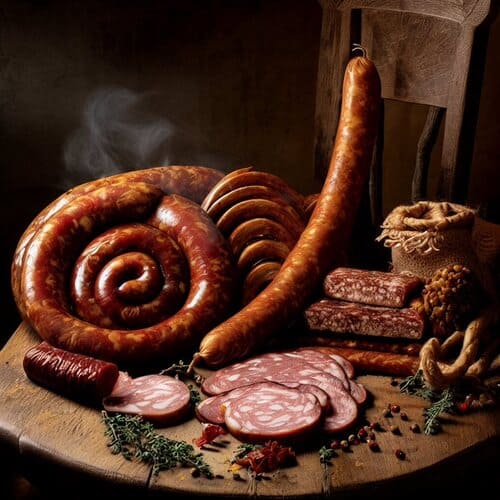
Pork casings (small intestine, called "menus") are among the most popular for making sausages. These casings are often used for sausages like Toulouse, black puddings, white puddings, Figatelli (Ø 26-36), dry sausages, and Italian sausages (Ø 36-45). Known for their strength and elasticity, pork casings are easy to work with. Pork and sow casings come in multiple calibers, offering a wide variety of sausage sizes.
Large pork casings (large intestine) are more suited for making dry sausages (dry sausage, Landes blood sausage, country blood sausage) for bung, Lorraine-style sausages and liver sausages for fuseau, and Morteau-style sausages and andouillettes for chitterlings.
Pork casings are also recognized for their natural texture and ability to retain spices and flavors well. They’re highly valued by traditional sausage lovers for their unmatched crunch. Furthermore, pork casings are easy to find, especially from Cebonat, your trusted source for sausage casings.
Sheep Casings
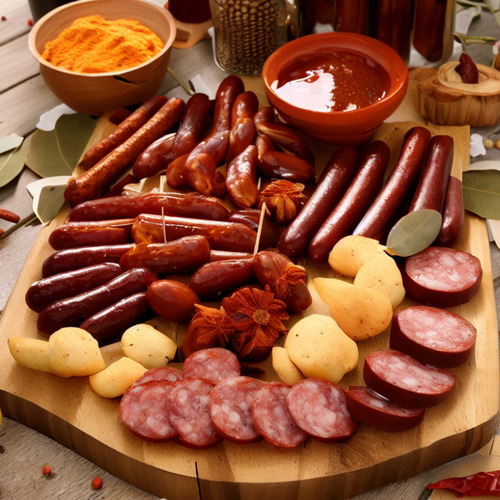
Sheep casings are most commonly used for smaller sausages like chipolatas, merguez, knacks, and Frankfurt sausages.
They are typically finer and more delicate than pork casings, which can make sausage making a bit more challenging for beginners. However, their delicate nature offers a mouthfeel that many enjoy.
Their smaller diameter makes them ideal for producing smaller sausages, perfect for barbecues or as appetizers. Sheep casings are also popular for making regional specialties. They’re available in several calibers (Ø 18 to 28) at Cebonat.
Beef Casings
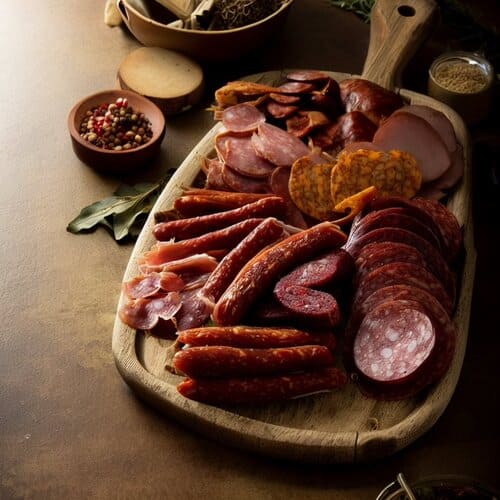
Beef casings are typically used for larger sausages, such as dry sausages, cooking sausages, garlic sausages, and other types of straight sausages (beef bung Ø 50-65) or curved sausages (small intestine Ø 34-48). They are larger and sturdier than pork or sheep casings.
Beef casings are known for their durability, making them ideal for charcuterie that requires long drying or cooking times. Their generous size is perfect for creating large sausages and sausages meant for group gatherings or extended storage.
Horse casings are primarily dedicated to making andouille.
Beef and horse casings also offer a unique texture with a distinct chewiness that adds an extra dimension to your charcuterie. You can find them at Cebonat in various sizes, tailored to your needs.
Conclusion
Whether you’re a charcuterie enthusiast or a professional, choosing the right casing can significantly influence the taste, texture, and appearance of your sausages. At Cebonat, we proudly offer a wide selection of pork, sheep, and beef casings to help you create the perfect sausage. Don’t hesitate to contact us for more information on our products and services.





